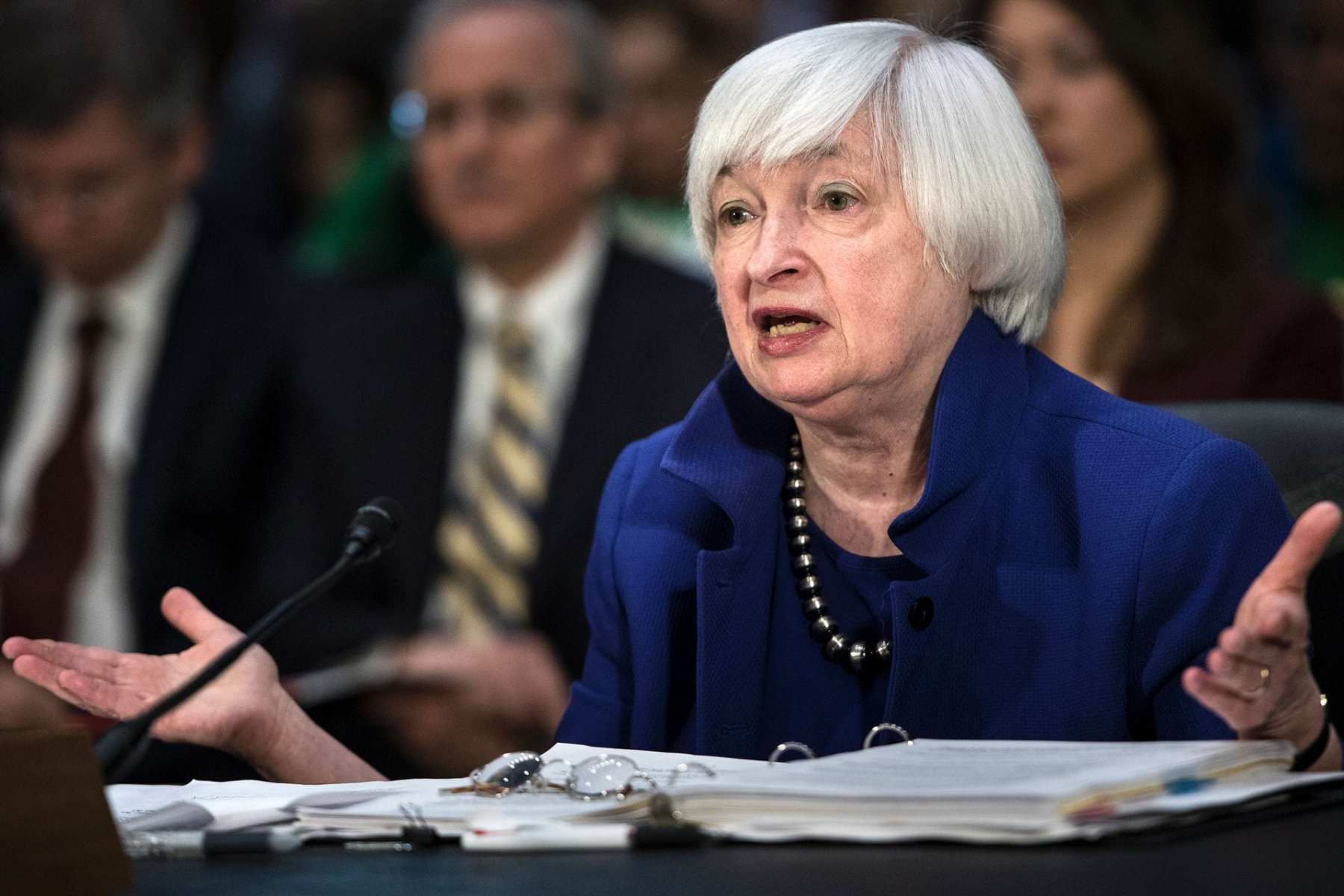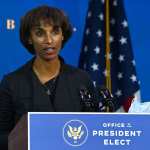For the latest news on the historic presidential inauguration and impacts of the new administration, subscribe to The 19th’s daily newsletter.
Janet Yellen, the potential first woman Treasury secretary, outlined her vision for an economic recovery during the start of her Senate confirmation hearings Tuesday. Her economic plan, she said, will focus almost entirely on getting immediate help to the neediest families in the first months of the Joe Biden presidency.
Yellen, a well-regarded economist, would become the first person in history to have held the top economic posts in the nation — chair of the White House Council of Economic Advisers, chair of the Federal Reserve and Treasury secretary — if confirmed by the Senate.
“Some have joked that Janet’s husband of 42 years, George, won the Nobel Prize in Economic Sciences, yet he is regarded by many as the second-most accomplished economist in his own home,” Sen. Dianne Feinstein, the Democrat from California, said when introducing Yellen.
Yellen, 74, opened the hearing before the Senate Finance Committee by talking about her father, a doctor who saw patients on their stoop in Brooklyn, many of them people who came from a working-class neighborhood.
“He was the kind of doctor who treated the whole patient. He knew about their lives, about when they had been fired and couldn’t pay,” Yellen said. “Economics is sometimes considered a dry subject, but I’ve always tried to approach my science the same way my father approached his: as a means to help people.”
That set the stage for how she views today’s economic issues — and what her priorities will bet as the country’s leading economic voice. Yellen said she supports the policies Biden has outlined in a $1.9 trillion proposal released last week to lift up families, particularly people of color and women. Specifically, reopening schools, getting more funding for unemployment insurance, raising the minimum wage, enacting a federal paid leave policy, offering rental assistance, helping those suffering from food insecurity and addressing the child care crisis are top of mind for her.
Yellen said the policies she believed would create “the biggest bang for the buck” would be the “relief that we provide to those who are in the greatest need and to small businesses,” as well as large investments in public health to get the virus under control and reopen schools and businesses.
All of those topics have significant funding under the Biden plan, which is proposing $400 billion for measures to address COVID-19 that include a mass vaccination program, as well as $1.9 trillion in economic aid to working families most impacted by the pandemic recession.
“Neither the president-elect nor I proposed this relief package without an appreciation for the country’s debt burden. But right now, with interest rates at historic lows, the smartest thing we can do is act big,” Yellen said. “In the long run, I believe the benefits will far outweigh the costs, especially if we care about helping people who’ve been struggling for a very long time.”
Those dollar figures are likely to come up against opposition, even in two congressional chambers that have narrow Democratic majorities. Last year, discussions over a second round of stimulus stalled for months as Republicans and Democrats argued over the final dollar amount.
“What I’m concerned about is we seem to have no concern now about borrowing money in the short term. And the argument is that interest rates are low — it’s like free money. It’s not. It has to be paid back,” said South Dakota Sen. John Thune, a Republican. “When is it enough, when is it too much? When do we hit that point where the thing starts to collapse?”
Yellen argued that “scarring” — the long-term impact to workers and small businesses that may never recover — could unmoor the economy further.
“It’s essential that we put the federal budget on a path that is sustainable, and that we’re responsible,” she said. “But the most important thing in my view that we can do today to put us on a path of fiscal sustainability is to defeat the pandemic, to provide relief to American people and then to make long-term investments that will help the economy grow.”
One of the groups most likely to get that short-term aid is women, who stand to benefit the most from expanded unemployment insurance, paid leave policies, rental assistance and aid to help the child care industry. In the past year, women have lost more jobs than men as a result of overrepresentation in the fields most affected by the pandemic and social distancing guidelines. They’ve also dropped out of the labor force at alarming rates to care for children following mass daycare closures. About 700,000 parents — two-thirds of them working mothers — left the labor force last year to care for a child.
The labor force participation rate for women in the United States peaked in the nineties and has remained largely flat since, while other countries have improved. Much of that, Yellen said, has been due to a lack of focus on policies that women workers need to stay employed.
“Where we stand out is that the United States does much less on the front of child care and paid leave than most other developed economies,” she said. “It’s really critical to address those shortages, and it’s been more than evident in the pandemic.”
That’s why policies like stimulus checks of $1,400 — a solution Biden has proposed in his plan — could help women who don’t qualify for unemployment insurance but who have lost work or left jobs due to caregiving responsibilities, Yellen said.
Those burdens are felt most by women of color. Latinas still have the highest unemployment rate of any group at 9.1 percent. Black women’s unemployment rate is 8.4 percent, while for White women it’s 5.7 percent.
Yellen said focusing on minority communities will be a top priority for her. The first meeting she held following her nomination to the role was with racial justice and equity groups.
Thea Lee, the president of the Economic Policy Institute, and an attendee at that meeting in December, said at the time that the group that attended felt “a tremendous openness and willingness to work” from Yellen and Wally Adeyemo, the deputy Treasury secretary-designee.
One example Yellen cited specifically that could help minority communities is a proposal in Biden’s plan that would provide $175 billion in low-interest loans and venture capital to entrepreneurs, plus $35 billion to small-business financing programs and $15 billion in grants to the hardest-hit small businesses.
Her hearing lacked some of the tension of confirmation hearings of the past, with most senators saying they hoped to build on existing relationships with Yellen. Still, differences remain surrounding the deficit and issues like the 2017 tax law Trump passed that dropped the corporate tax rate from 35 percent to 21 percent, as well as Biden’s plan to increase taxes for those making more than $400,000 a year.
“The last thing we should be doing, in my opinion, is raising taxes — not ever in fact, but especially not during or after a pandemic,” said Montana Republican Sen. Steve Daines.
“The focus right now is on providing relief and on helping families keep a roof over their head and food on the table, and not on raising taxes,” Yellen said. “But longer term, I think it’s important to [be] …investing in people, investing in infrastructure, investing in research and development, in manufacturing and things that will create good jobs. To make our economy more productive, we need to think about taxes in the context of a package that aims to do those things.”
Sen. Ron Wyden, the ranking member of the Senate Finance Committee, urged lawmakers to get their final questions to Yellen by Wednesday so that she could potentially go before the Senate floor as soon as Thursday for a confirmation vote.
“This is a person who has been confirmed again and again and again,” Wyden said. “I hope she’ll be on the floor on Thursday.”
The need to move quickly was echoed by the eight living former Treasury secretaries — four Democrats and four Republicans — who, in an endorsement letter sent Tuesday, encouraged the Senate to confirm Yellen as soon as possible to avoid any additional economic suffering.
“It is our view — based on personal experience for many of us — that Dr. Yellen’s experience, knowledge, judgment, and character make her uniquely qualified for this role,” the former Treasury secretaries wrote. “It is hard to imagine a better prepared nominee to meet this great moment of need than Dr. Yellen.”






